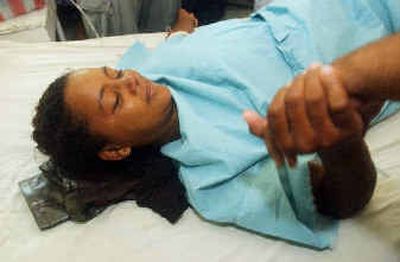Dominicans lost at sea contemplated cannibalism

NAGUA, Dominican Republic – Migrants who survived on a small wooden boat for nearly two weeks described on Wednesday how they watched passengers attack a woman for her breast milk and how others died of dehydration on a journey that left 55 dead.
Some on the trip simply began to lose their minds after food and water ran out, a survivor said.
“A lot of people just jumped off,” said Faustina Santana, one of 39 migrants who survived the journey. Eight of the 55 victims died shortly after their rescue.
The migrants’ 30-foot boat was found by fishermen on Tuesday only about 30 miles from where it departed the village of El Limon on July 29. The Dominicans had set out for wealthier Puerto Rico in search of work or a better life.
“We couldn’t make it with what my husband earned so we had to try something,” said Odales de Jesus, 29, a survivor and mother of two whose face was still swollen and red.
Doctors were treating the 31 survivors Wednesday.
Fleeing the ravages of a poor economy, the number of Dominicans migrating to Puerto Rico has risen considerably the past year. Thousands of migrants have been detained since October, and dozens have been lost at sea.
The boat had almost reached the Puerto Rican island of Desecheo two days after it left the northern coast of the Dominican Republic when its engine failed. The captain abandoned ship, getting on another migrant boat and saying he would return with help.
He never did.
The boat drifted out to sea and by the third day all of the water and food – chocolate, peanuts and sardines – had run out. The passengers, who paid about $450 each for the trip, shared one coconut they found floating in the sea, but panic soon set in.
Many people – mostly older men – began dying on the fifth day, the same day some of the men began demanding that women, even those who were not lactating, provide breast milk.
Two lactating women offered their breast milk to passengers. One who refused was thrown overboard by male passengers, Santana said, although some survivors said the woman was pushed overboard after she died.
“One woman refused to give breast milk and the men aboard grabbed her from behind and threw her overboard,” Santana said. “They told me to give milk and I said I couldn’t.”
The mother of a 6-month-old baby, Vernanva de La Cruz, 19, offered her breast milk to more than eight people. The other woman who gave her breast milk died after helping nearly a dozen people.
“People started biting her everywhere to get at her nipples,” de La Cruz said from her hospital bed. “She had bruises everywhere when she died.”
It was unclear when or how the woman died, said de La Cruz.
The survivors interviewed by the Associated Press said there were no children aboard the boat.
Dozens of relatives filled hospital corridors Wednesday looking for loved ones.
The wary father of one passenger entered Santana’s hospital room, showed Santana a picture of his son and asked if had jumped. She looked at the photo and said that he had.
Rafael Emilio Chalas, director of the Antonio Yapor Hospital in Nagua told a Dominican radio station Tuesday that some people said they resorted to cannibalism.
One survivor, however, denied that. “Some wanted to eat the dead bodies, just their ears. But others of us said ‘no,’ and if we’re going to die, we’ll all die together,” said Ramon Ballano, 40.
The migrants’ boat, called a yola, was about 10-feet wide with no seats and no oars. After the engine failed, passengers put up a makeshift flag made from a white T-shirt, hoping that other passing boats would stop to help.
“What I earn doesn’t give us enough,” Ballano said from the Dominican hospital. “I had no future here.”